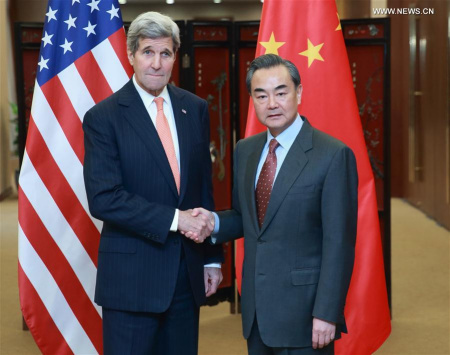
Chinese Foreign Minister Wang Yi (R) shakes hands with U.S. Secretary of State John Kerry in Beijing, capital of China, Jan. 27, 2016. (Photo: Xinhua/Ding Haitao)
As U.S. Secretary of State John Kerry raised "concerns" about the South China Sea during his Asia tour, he may have been unaware of one thing: the U.S. meddling in the issue is an ill-considered move, which could boomerang and escalate regional tensions.
Before visiting China, Kerry stopped in Laos -- the 2016 chair of the 10-member Association of Southeast Asian Nations (ASEAN) -- and Cambodia, two important neighbors and trade partners of China.
Kerry's calculated decision to visit Laos and Cambodia demonstrates the U.S.'s ulterior motives in counting on ASEAN to pressure China on the South China Sea issue, mere wishful thinking on the part of Kerry and Washington.
Western media reports only quoted Kerry's remarks after meeting with Lao Prime Minister Thongsing Thammavong and Thongsing's words that were paraphrased by Kerry.
Vientiane Times, Laos' English-language newspaper, reported Kerry's visit, but did not mention one single word about the South China Sea.
In Cambodia, Foreign Minister Hor Namhong stressed his country's position on the South China Sea issue was unchanged, saying that Cambodia believed individual countries should settle disputes among themselves without the involvement of ASEAN.
It is questionable whether the United States has managed to rope Laos and Cambodia in on the South China Sea issue.
But one thing is clear: a growing number of sober-minded governments -- not only those of Laos and Cambodia -- know that the United States, a self-proclaimed bystander on the issue, intends to meddle in the region and expand its own influence in a bid to counter China's peaceful rise.
Although Washington says it supports a peaceful resolution, its actions -- from criticizing Beijing's construction activities on Chinese-owned islands to signing a military deal with the Philippines -- only serve to undermine regional peace and stability.
The Chinese government has repeatedly called on all related parties to solve any maritime dispute through negotiations and earnestly implement the Declaration on the Conduct of Parties in the South China Sea.
Disputes in the South China Sea should not be of concern in a China-U.S. relationship, one of the world's most important. Together, the two countries play a significant role in safeguarding world peace and stability.
This is why Mr. Kerry put China on the agenda of his first overseas trip in the new year. There is wide expectation that his visit would enhance mutual trust, avoid strategic miscalculations, manage and control differences and expand cooperation between China and the United States.
Therefore, it is highly advisable that Washington plays a constructive role in promoting peace and stability in the Asia-Pacific region, of which the United States is an important part, instead of sowing discord, because muddy the waters in the South China Sea could blow up in Washington's face.


















































